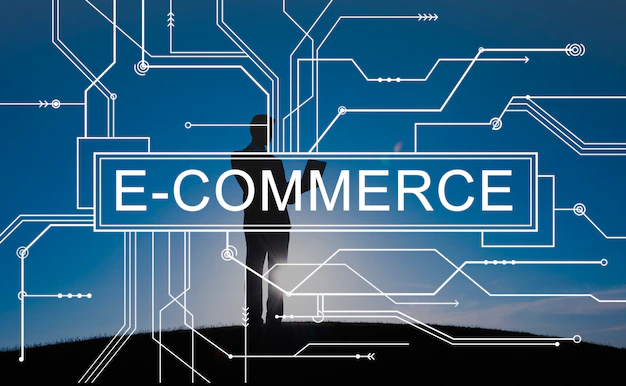Headless Commerce Solutions: An Evolutionary Leap Beyond Traditional Commerce
5 Mins Read
Published on: 25 September 2023
Last Updated on: 16 July 2024

toc impalement
In the swiftly evolving digital commerce landscape, the concept of ‘Headless Commerce’ has emerged as a game-changer, offering a groundbreaking alternative to conventional e-commerce platforms.
This article delves into the nuances of headless commerce solutions, contrasting them with the traditional commerce approach, and provides an insight into the top-notch headless commerce development services offered by DigitalSuits.
Breaking Down The Concepts: Headless Commerce Vs. Traditional Commerce
Before diving into the comparative analysis, it’s vital to understand what these terms mean.
Understanding Headless Commerce
Headless commerce is a unique architecture design in the eCommerce realm where the front-side presentation layer (the ‘head’) is decoupled from the back-end commerce functionality. The term ‘headless’ is derived from this separation of the front-side and back-end systems.
The distinct characteristic of headless commerce solutions is the reliance on APIs (Application Programming Interfaces) to facilitate communication between the front-side and back-end layers. This decoupling ensures a higher degree of flexibility and customization, enabling businesses to deliver seamless, personalized user experiences across multiple digital touchpoints.
Traditional Commerce: An Overview
Traditional commerce, on the other hand, refers to a monolithic architecture where the front-side and back-side systems are tightly integrated within one platform. In this model, any changes to the customer-facing front-end sometimes necessitate modifications to that of the back-end, restricting the flexibility and speed of implementing updates or new features.
The Key Differences: Headless Commerce Vs. Orthodox Commerce
Having understood the fundamental concepts, let’s delve into the core differences between headless commerce and traditional commerce.
1. Freedom For Front-End Developers
In traditional commerce platforms, front-end developers are bound by the design and functionality determined by the platform. Altering the user experience or data entails modifying the database, code, and front-end, making minor changes a significant business risk.
Conversely, headless commerce solutions liberate front-end developers, allowing them to craft a bespoke user experience tailored to the business without bothering about the back-end alterations.
2. Limitless Personalization And Customization
The traditional or general platforms of e-commerce come with predefined experiences for end-users and administrative users. In contrast, headless commerce platforms empower businesses to tell buyers and administrators about the appropriate experience they desire, offering near-limitless customization and personalization possibilities.
3. Improved Time And Increased Valuation
In most eCommerce platforms, back-end logic in business, functionality, and competencies constitute up to 85% of the development process of the software. With headless commerce solutions, businesses can focus on enhancing the experience of customers, delivering an ultimate solution faster, and at a lower cost.
The Upside Of Headless Commerce

If you’re still contemplating if the headless commerce is the right fit for your business. Here we put a few compelling advantages to consider:
1. Agility And The Flexibility
Headless commerce solutions offer unparalleled flexibility and agility, enabling businesses to be used to the changing conditions and scenarios of the markets and evolving customer expectations. The decoupled nature of headless commerce allows for independent updates and changes, facilitating rapid iterations and upgrades.
2. Improving The Experience Of The User
Headless commerce enables businesses to provide fully personalized and, at the same time, immersive user experiences across different digital touchpoints. By leveraging the most updated front-end technologies, businesses can offer intuitive and seamless experiences to their consumers.
3. Omnichannel Commerce
Headless commerce facilitates consistent shopping experiences across different channels, from websites and mobile apps to smart devices and rising technologies like Augmented Reality (AR) and Virtual Reality (VR).
4. Scalability And Delivering Performance
The architecture of headless commerce ensures performance benefits and, at the same time, scalability. The decoupled nature allows business owners to uplift each and every component, ensuring the system can cope with the increase in traffic and volumes of transactions without compromising performance.
5. Integration Plus Customization
Headless commerce allows owners of businesses to easily integrate different plugins, third-party services, and platforms, like shopping carts, content management systems (CMS), product management tools, and payment processing.
6. Shielding Tomorrow
Headless commerce solutions deliver a foundation for businesses. As new and emerging technologies and channels crop up businesses can integrate and be used to them into their commerce ecosystem. At the same time, they do not have to rebuild the system in its entirety.
The Not-So-Rosy Side Of Headless Commerce
Despite the manifold benefits, headless commerce isn’t the silver bullet for every business. Here are a few potential drawbacks:
1. Cost And Complexity
Using multiple vendors for a single site can escalate both cost and complexity. Customization could also lead to implementation challenges, and without a robust roadmap, businesses could end up in a customization nightmare.
2. Additional Load On Teams
The shift to a headless solution could burden your teams as the best developers would need to manage APIs, and integrations, and ensure a seamless customer experience.
3. Not A Plug-And-Play Option
Traditional commerce offers the advantage of an all-in-one package. In contrast, a headless solution isn’t a plug-and-play option. Businesses need to create a comprehensive plan before assembling the array of solutions for a headless commerce platform.
Is Headless Commerce The Right Fit For You?
Headless commerce solutions ideally cater to larger businesses with complex business requirements and sophisticated developer teams that can leverage the additional flexibility. Businesses working with partners like DigitalSuits, a leading headless commerce development company, can maximize the resources available and build fast, secure, and modern web solutions.
However, if you’re running a smaller business with relatively simple needs, or if you’re seeking a quick launch without extensive customization, a traditional commerce platform could be a better fit.
The Digitalsuits Advantage In Headless Commerce Solutions
The team at DigitalSuits offers unparalleled headless commerce development services, crafting fast, secure, and modern web solutions. Whether you’re a large enterprise seeking a highly customized solution or a growing business with evolving needs, DigitalSuits can help you navigate the complexities of headless commerce and deliver a solution that propels your business growth.
Wrapping Up
The choice between headless commerce and traditional commerce boils down to your business needs, goals, and resources. Headless commerce solutions could be the way forward if you prioritize flexibility, customization, and future-proofing your business. Remember, the right eCommerce solution is the one that aligns with your business strategy and empowers you to deliver a seamless, personalized customer experience.
Read Also:


















Comments Are Closed For This Article